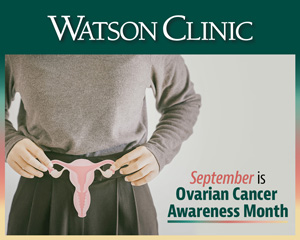 Breast cancer news stories are common, but few stories discuss its deadlier cousin, ovarian cancer. What do you know about ovarian cancer? What do you need to know?
Breast cancer news stories are common, but few stories discuss its deadlier cousin, ovarian cancer. What do you know about ovarian cancer? What do you need to know?
What is ovarian cancer?
Ovarian cancer can involve the ovaries or related areas of the fallopian tubes or peritoneum—the membrane that lines abdominal organs.
One in 78 women will get ovarian cancer, compared with 1 in 8 for breast cancer. Although it is much less common than breast cancer, ovarian cancer has a much higher mortality rate.
Why is ovarian cancer so deadly?
The symptoms of ovarian cancer are not specific and are often the same as symptoms caused by other conditions. They frequently don't show up until the disease is advanced, often after it has spread to other organs in the body.
What symptoms should I look out for?
Common complaints include:
- Bloating.
- Pelvic or abdominal pain.
- Trouble eating or a feeling of fullness.
- Changing bowel habits.
- Back pain.
- Pain during sex.
- A swollen belly such that clothing is becoming tight, yet combined with weight loss.
Am I at risk?
It's impossible to predict for certain who will get the disease, but factors that can increase your risk include:
• Your age. The disease is most common in women 55 years and older, though younger women can get it too.
• Your pregnancy history. Women who have never been pregnant or had a full-term pregnancy, or those who had their first full-term pregnancy after age 35, are at higher risk.
• Your weight. Being at an unhealthy weight increases risk.
• Your personal or family medical history. Having a close female relative with ovarian cancer or a family or personal history of breast, uterine or colorectal cancer may be associated with an increased risk of ovarian cancer.
• If you carry certain genes that predispose to an increased likelihood of developing ovarian cancer.
• Your race/ethnicity. White women and women with Eastern European or Ashkenazi Jewish backgrounds are at higher risk.
• If you smoke.
Ovarian cancer is the fifth leading cause of cancer death in women. You can avoid becoming a part of this statistic if you stay informed and vigilant. Schedule regular exams with your Watson Clinic Gynecology specialist, and voice any concerns you have regarding the symptoms and risks for ovarian cancer.
Sources: American Cancer Society; Centers for Disease Control and Prevention; National Ovarian Cancer Coalition